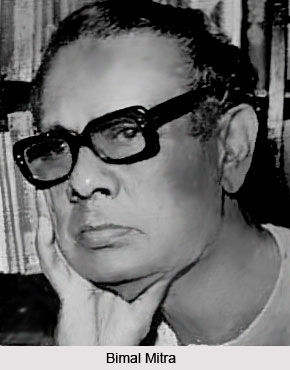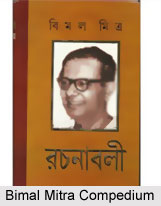 Bimal Mitra was one of the most popular contemporary writers in Bengali Literature and Hindi. Born in 1912, he had decades of writing novels behind him. Some of his more popular books have been made in to vastly appreciated films like the Guru Dutt classic "Anyaroop" (in Bengali) or "Sahib, Bibi aur Gulam" in Hindi (Gentleman, Lady and the Slave).
Bimal Mitra was one of the most popular contemporary writers in Bengali Literature and Hindi. Born in 1912, he had decades of writing novels behind him. Some of his more popular books have been made in to vastly appreciated films like the Guru Dutt classic "Anyaroop" (in Bengali) or "Sahib, Bibi aur Gulam" in Hindi (Gentleman, Lady and the Slave).
Career of Bimal Mitra
In his long-spanning career, Bimal Mitra has written more than 100 books and short stories. Given Mitra`s national stature in the literary world (his works have been translated into almost all Indian languages) and his appeal in tinsel town one needs to trace the journey of "Sahib Bibi aur Ghulam" which in turn traces the solitary story of Chotti Bahu, the younger bride of a feudal family in Kolkata and her fight to win her husband from alcohol and courtesans till she herself becomes a salve to the nuances of alcoholism, and then her desperate strife to come out of it. Chotti Bahu`s story is closely linked to that of a poor rural boy, Bhootnath, in love with the Jaban, the daughter of a widower Brahamasamaji father. In the background, there is the independence struggle from the British Rule and the reformist movement of Hinduism.
His last book is "Dayare se bahar" (Outside the boundaries). The very unfurling of the book is marked by a sense of strange ambience. He starts by saying that this is a new version of his first novel "Rakh" (Ash) and that earlier, he had finished the story at one point, while today "he knows something more about what happened to the main actors of his story" so this new part has been added.

Once one starts it, the human story grips and one can`t put it down. The four main actors of this book are Shekhar, the idealist arm chair revolutionary who has left his rich father`s home in search of India`s independence; Suruchi, the young girl who loves Shekhar and is carrying his child; Mrinmayi, the mother of Suruchi, who is sick but decides to playact to be pregnant so that her unmarried daughter`s name and honour can remain intact; and finally Sadanand, Suruchi`s intellectual father who is lost in his world of books and ideas. The whole story is played out against the backdrop of Second World War.
It is the last part of the book "Dayare se Bahar", that Bimal Mitra described as the "new part of the story that he had discovered later", that he touches on themes of philosophy and spirituality. It is through the character of Gaurdass and his dialogues with guilt ridden tormented Suruchi, Bimal Mitra talks about "his own" philosophy of life.
When it comes to litterateur Bimal Mitra, Bollywood is forever ready to borrow a leaf from his voluminous works. No wonder directors keep flying down to his Chetla residence every now and then to discuss possibilities of filming a novel or remaking a film based on his work.
Explaining the role of literature, he writes, "Human beings expect a lot from literature. They expect joy, thrill and contemporary enjoyment. Even more than all these, they expect to receive some thing from literature. The same expectations are there, also from theatre. In literature and theatre, the expectation of enjoyment is much less compared to that of to receive an understanding.













